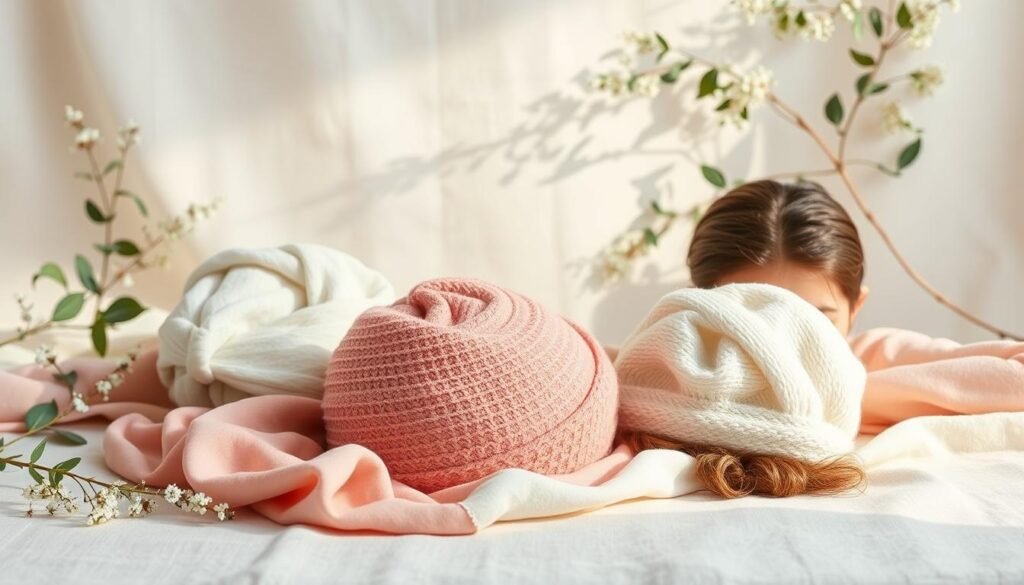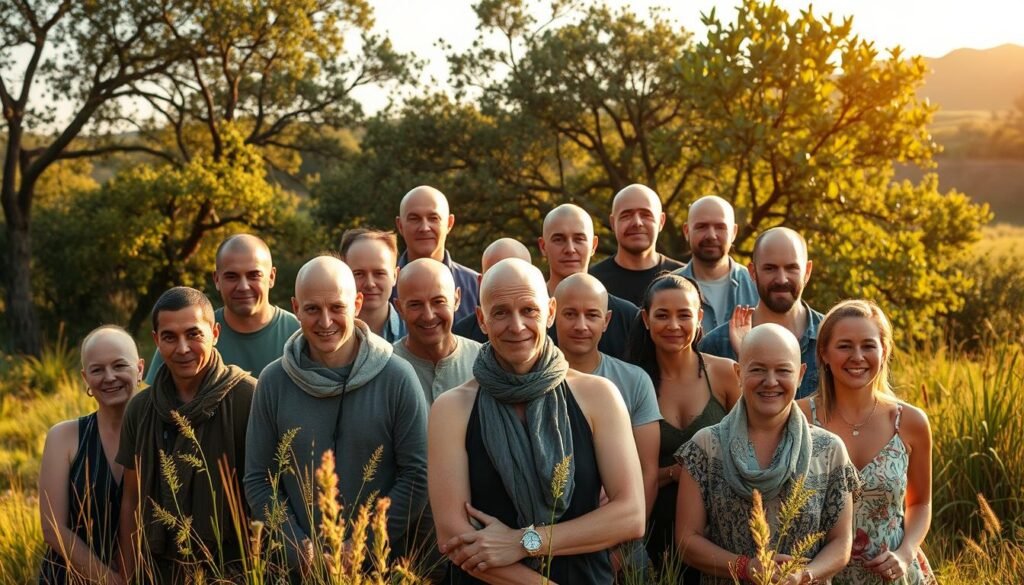About 6.8 million people in the U.S. live with alopecia areata. This autoimmune condition leads to unexpected hair loss. It can be tough, affecting more than just how we look. It hits self-esteem and emotions hard too.
Having alopecia means facing both physical and psychological challenges. Understanding how to manage it and getting support is crucial. This piece gives insights and tips for those dealing with alopecia.
Here, you’ll learn ways to cope and boost your confidence. There’s info on finding support and growing stronger through this ordeal. For more on coping, the Alopecia Center of Excellence at Mount is a great resource.
Key Takeaways
- Understanding alopecia is essential for effective management.
- Emotional support plays a crucial role in building confidence.
- Practical strategies can alleviate feelings of isolation.
- Maintaining a positive mindset is vital for coping.
- Connecting with communities can enhance resilience.
- Professional help may be necessary for emotional well-being.
Understanding Alopecia: Types and Causes
Alopecia includes different forms of hair loss, such as autoimmune alopecia. It impacts your look and how you feel emotionally. By learning about various alopecia types and what causes hair loss, you can gain insights essential for tackling this issue.
Different Types of Alopecia
It’s key to know the types of alopecia to find the right treatment. The most seen kinds are:
- Alopecia Areata: This type causes sudden hair loss in patches. It mostly happens on the head but can occur elsewhere.
- Alopecia Totalis: Here, a person loses all hair on their scalp. It’s a more serious version of alopecia areata.
- Androgenetic Alopecia: Known as male or female pattern baldness, it’s driven by genes and hormones. Over time, it affects hair thickness and growth.
Common Causes of Hair Loss
The reasons behind hair loss vary and come from different sources. Knowing these can help in finding ways to manage it:
- Genetic Predisposition: Especially key in androgenetic alopecia, where family history matters a lot.
- Autoimmune Disorders: In conditions like alopecia areata, the body’s immune system attacks hair follicles, causing hair loss.
- Environmental Factors: Hair loss can worsen due to toxins, harsh hair treatments, and stress. Your diet and lifestyle also play a role in hair health.
Living with Alopecia: Personal Stories and Experiences
Living with alopecia is a journey unique to each person. It’s a mix of ups and downs. Understanding these stories helps us feel connected. People from different backgrounds share their challenges and wins.
Insights from Individuals with Alopecia
Those who share their stories highlight their own path. Many talk about the shock of hair loss and how it changed their view of beauty. Graphic designer Amanda shares,
“It took time for me to accept my new look. A supportive friend encouraged me to embrace my identity, which made a profound difference.”
This sharing creates a bond among those living with alopecia. It makes them feel they are not alone.
Sharing Coping Strategies
Learning to cope with alopecia is key. A positive attitude is crucial. Mindfulness and creativity help manage emotions. Finding support groups offers comfort and a chance to learn. The goal is to accept oneself and build strength.
Alopecia Coping Strategies: Finding Your Path
For those living with alopecia, finding effective coping strategies is key. These methods improve emotional strength and help create a supportive community. They foster a positive view, making the hair loss journey somewhat easier.
Emotional Resilience Techniques
Building emotional resilience is a big help for anyone dealing with alopecia’s ups and downs. Useful strategies include:
- Mindfulness meditation to become more self-aware and lessen anxiety.
- Journaling to reflect on thoughts and feelings.
- Positive affirmations to increase self-love and confidence.
Adding these emotional resilience methods to daily life sets a strong base for handling hair loss. For deeper insights on alopecia, here’s a great resource.
Building a Support Network
Having a support network is essential for feeling emotionally strong. Connecting with loved ones and people in similar situations brings a sense of community. A support network offers:
| Benefit | Description |
|---|---|
| Emotional Support | Talking to someone about your feelings lessens loneliness. |
| Shared Experiences | Meeting others provides common strategies and understanding. |
| Resource Sharing | It gives you access to info on products, treatments, and support. |
By engaging with online communities, this support network grows. Joining forums or social media groups adds more contacts and knowledge for those facing alopecia.
Hair Loss Management: Practical Tips
Dealing with hair loss takes careful planning and the correct items. People with alopecia should pick good hair items and solutions. These are for their sensitive scalps. Here are vital tips to help manage hair loss well.
Choosing the Right Hair Accessories
Finding the best hair accessories for alopecia boosts confidence. It also offers comfort. Important choices include:
- Scarves: These are stylish and can be worn in many ways. They’re great for daily use.
- Hats: Hats keep you warm and stylish in cold weather.
- Wigs: Quality wigs look like real hair and come in many styles. They raise confidence for any event.
Picking the right colors and materials helps create a look that is comfortable and stylish.
Haircare Products for Sensitive Scalps
Alopecia can make the scalp sensitive. Using products made for sensitive scalps helps keep it healthy. Here are some good choices:
- Natural shampoos: These don’t have harsh chemicals. They clean gently without irritating the scalp.
- Hypoallergenic conditioners: They’re made for sensitive skin. These conditioners moisturize without causing allergies.
- Moisturizing oils: Oils like argan or jojoba keep moisture in. They help the scalp stay healthy.

| Accessory Type | Benefits |
|---|---|
| Scarves | Stylish, versatile, and customizable looks. |
| Hats | Provides warmth and complements different outfits. |
| Wigs | Offers a range of styles and colors for different occasions. |
| Natural Shampoos | Gentle cleansing without irritation. |
| Hypoallergenic Conditioners | Moisturizes while preventing allergic reactions. |
| Moisturizing Oils | Retains moisture for a healthy scalp. |
Using these tips can greatly help with hair loss management. It makes life easier for those with alopecia.
Alopecia Support: Resources for Comfort
Finding support with alopecia can greatly improve your experience. There are many ways to connect with others who understand. You can share coping techniques in a community setting. Using alopecia support resources can uplift and empower you on your journey.
Online Communities and Forums
Online forums are a great place to meet people who get what you’re going through. You can share stories, get advice, and feel supported. Some top online communities include:
- The Alopecia Areata Support Group on Facebook
- Reddit’s r/Alopecia forum
- Alopecia World – a dedicated online platform for people with alopecia
Support Groups in Your Area
Meeting with local support groups can be very helpful. Communities often have special groups for those with alopecia. Finding local support provides a network of understanding friends. Here are some organizations to check out:
| Organization | Location | Contact Info |
|---|---|---|
| Alopecia Areata Foundation | National (various chapters) | (800) 561-2580 |
| National Alopecia Areata Coalition | Available nationwide | info@naac.org |
| American Hair Loss Association | All States | (800) 123-4567 |
Alopecia Lifestyle Adjustments: Embracing Change
People with alopecia may benefit from changing their lifestyle. Techniques for mindfulness and relaxing can help emotionally. Changing what you wear allows for self-expression. These changes can boost your mental health and confidence.
Mindfulness and Relaxation Techniques
Using mindfulness techniques daily can lessen hair loss anxiety. Meditation, deep breathing, and yoga promote peace. They help you connect with yourself. Doing these each day strengthens emotional health.
Adapting Wardrobe and Style Choices
Changing your clothes matters a lot in your alopecia journey. Choosing outfits and accessories that make you feel good boosts self-esteem. Trying different styles, colors, and textures shows off your unique style. This helps you feel more confident with others.

For more help and advice on alopecia, check out this guide. With mindfulness and smart fashion choices, you can face hair loss positively.
Emotional Impact of Alopecia: Navigating Feelings
Living with alopecia introduces deep emotional challenges. People face a mix of feelings due to hair loss. Alopecia’s impact isn’t just about how one looks but also the inner battles. These include working through grief to ultimately accepting the situation.
Understanding Grief and Acceptance
Grief and acceptance are key when facing alopecia’s emotional ride. One might feel sad, mad, or confused about their changed appearance. It’s important to face these emotions for personal growth.
The journey often starts by acknowledging the loss. Then, it gradually leads to accepting hair loss and redefining beauty standards. This shift can deeply change someone’s view on beauty and hair loss.
Strategies for Building Self-Confidence
Boosting self-confidence with alopecia takes ongoing effort. Here are ways to help:
- Set Achievable Goals: Begin with small goals for big accomplishments.
- Engage in Positive Self-Talk: Focus on positive thoughts and celebrate your strengths.
- Participate in Activities: Find groups or hobbies that boost community bonds and self-esteem. Try art or sports.
- Seek Support: Connect with those who get the struggle. This can uplift you and make you feel valued.
Using these tactics, you can grow your self-confidence. This helps create a positive view of oneself while dealing with alopecia’s emotions.
Embracing Alopecia: Celebrating Your Journey
Embracing alopecia is a unique journey of finding strength and resilience. It’s about seeing the beauty beyond hair and learning to accept yourself. This path leads to personal growth and empowerment. It teaches us to value our identity more than our hair loss.
Finding Beauty Beyond Hair
Beauty comes in various forms, rooted in the confidence from within. For those with alopecia, redefining beauty means focusing on self-expression. Every scar and feature has its story. Through different styles and accessories, individuals can express their personality. This way, they make bold statements about who they are.
Sharing Your Alopecia Story
Telling your story creates a community of understanding. Platforms that allow for these stories build connections. By sharing journeys, people with alopecia forge a collective narrative of resilience. These stories highlight both the struggles and victories, painting a vivid picture of life with alopecia.

| Aspect | Traditional Beauty Standards | Beauty Beyond Hair |
|---|---|---|
| Definition | Beauty tied to hair and appearance | Inner confidence and self-acceptance |
| Focus | Conforming to ideals | Embracing individuality and uniqueness |
| Expression | Physical attributes | Personal style and character |
| Community | Often isolating | Fostering connections and support |
By embracing alopecia, people gain a deeper understanding of beauty. This leads to a society that values diversity and inclusion. It shows us that confidence and self-love are vital. This shift in view inspires and influences others positively.
Alopecia Self-Care: Prioritizing Mental Wellness
Dealing with alopecia means focusing on mental health. It’s important to put alopecia self-care first. This helps maintain emotional wellbeing amid hair loss. Daily affirmations encourage a strong, positive self-view and fight off bad thoughts.
Practicing Self-Love and Affirmations
Self-love changes how you see your condition. Saying “I am beautiful as I am” daily can change your attitude. It leads to acceptance. Including self-care in daily rituals boosts positive thinking. Affirmations boost confidence and show your worth isn’t just about looks. Doing this regularly betters mental wellness and makes alopecia’s emotional impact smaller.
Seeking Professional Help When Needed
Sometimes, you need more than self-care. Knowing when to get professional help is key. It helps handle the emotional side of alopecia. Therapy provides coping skills for your individual needs. Getting help promotes emotional development. It’s a brave step in healing.
Conclusion
Living with alopecia is a deep journey. It needs both strength and support. This article showed ways to deal with hair loss.
We talked about understanding alopecia and finding support. It’s key to use coping skills and love yourself on this journey.
We stressed the need for emotional strength. Making connections with those who get it is crucial. They offer comfort and let you share your story.
Self-care and being mindful can boost your inner peace. Even with alopecia, you can still feel confident.
Alopecia doesn’t define you. It can reveal new parts of you and how you see beauty. Readers should value their uniqueness.
Join groups that spread positivity. Every step you take helps build strong confidence. It leads to a happier life.